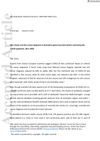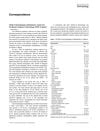 2 citations,
March 2022 in “PubMed”
2 citations,
March 2022 in “PubMed” Most skin reactions to COVID-19 vaccines in India were mild and not a reason to avoid vaccination.
 June 2023 in “Journal of cosmetic dermatology”
June 2023 in “Journal of cosmetic dermatology” A woman developed skin lesions after PRP injections, possibly linked to COVID-19 infection and vaccination.
 5 citations,
December 2021 in “Scientific Reports”
5 citations,
December 2021 in “Scientific Reports” Age affects how certain proteins involved in COVID-19 infection are expressed in mice, but sex hormones and heart injury do not.
 37 citations,
June 2021 in “Journal of the European Academy of Dermatology and Venereology”
37 citations,
June 2021 in “Journal of the European Academy of Dermatology and Venereology” Adult skin quickly reacts to short-term environmental and internal stress, leading to various skin issues and the need for protective measures.
 May 2022 in “CMAJ. Canadian Medical Association journal”
May 2022 in “CMAJ. Canadian Medical Association journal” Rosella C. believes an earlier diagnosis of Cushing disease could have prevented severe symptoms.
 39 citations,
June 2020 in “Dermatologic Therapy”
39 citations,
June 2020 in “Dermatologic Therapy” The COVID-19 pandemic led to an increase in untreated hair diseases and showed the importance of teledermatology.
 3 citations,
May 2021 in “British Journal of Dermatology”
3 citations,
May 2021 in “British Journal of Dermatology” The COVID-19 pandemic led to fewer skin checks and skin cancer diagnoses in Australia in 2020.
 3 citations,
July 2020 in “Journal of Cosmetic Dermatology”
3 citations,
July 2020 in “Journal of Cosmetic Dermatology” The COVID-19 pandemic led to more young people getting red stretch marks due to lifestyle changes like less activity and quick weight gain.
 2 citations,
April 2021 in “International Journal of Dermatology”
2 citations,
April 2021 in “International Journal of Dermatology” COVID-19 can cause skin issues like hives, rashes, and chickenpox-like eruptions, with women aged 31-40 being the most affected.
 9 citations,
November 2020 in “Medical Hypotheses”
9 citations,
November 2020 in “Medical Hypotheses” Hair loss may link to weaker COVID-19 immunity, suggesting possible need for extra vaccine boost.
 October 2023 in “TURKDERM”
October 2023 in “TURKDERM” COVID-19 reduced dermatology visits by 30.4%, with more male patients and increased cases of psoriasis, bullous diseases, and melanoma.
 5 citations,
May 2021 in “International Journal of Infectious Diseases”
5 citations,
May 2021 in “International Journal of Infectious Diseases” A man experienced hair loss after getting COVID-19, which improved with treatment and might have been triggered by stress related to the illness.
 2 citations,
September 2021 in “Curēus”
2 citations,
September 2021 in “Curēus” Tofacitinib may be safe for COVID-19 patients with alopecia without worsening symptoms, based on two cases.
 March 2024 in “Sudan Journal of Medical Sciences”
March 2024 in “Sudan Journal of Medical Sciences” Many doctors lack knowledge about COVID-19 skin symptoms and need better education and guidelines.

Social media data can help track and predict COVID-19 symptoms and trends.
 16 citations,
December 2020 in “International Journal of Clinical Practice”
16 citations,
December 2020 in “International Journal of Clinical Practice” The pandemic changed how often certain skin conditions were diagnosed.
 April 2023 in “Journal of Investigative Dermatology”
April 2023 in “Journal of Investigative Dermatology” People who had severe COVID-19 are more likely to experience hair loss.
 5 citations,
July 2021 in “medRxiv (Cold Spring Harbor Laboratory)”
5 citations,
July 2021 in “medRxiv (Cold Spring Harbor Laboratory)” Proxalutamide improved blood markers related to inflammation, immune response, and clotting in COVID-19 patients, potentially reducing hospitalizations.
 May 2023 in “Journal of contemporary medicine”
May 2023 in “Journal of contemporary medicine” Using Favipiravir, a COVID-19 treatment drug, likely doesn't cause hair loss.
 1 citations,
January 2021 in “Research Square (Research Square)”
1 citations,
January 2021 in “Research Square (Research Square)” The AndroCoV Clinical Scoring is an accurate, easy, and free way to diagnose COVID-19 without a lab test.
 5 citations,
December 2021 in “Journal of Cosmetic Dermatology”
5 citations,
December 2021 in “Journal of Cosmetic Dermatology” QR678 Neo® hair growth treatment is effective for hair loss caused by Covid-19.

COVID-19 may trigger or worsen rapid hair loss in alopecia areata.
 3 citations,
February 2022 in “Journal of Infection”
3 citations,
February 2022 in “Journal of Infection” People with no symptoms or mild COVID-19 have lower antibody levels, increasing their risk of getting COVID-19 again.
 September 2023 in “International journal of medicine”
September 2023 in “International journal of medicine” AI is revolutionizing healthcare by improving diagnosis, treatment, and monitoring, but still needs close supervision.
 January 2021 in “Middle East journal of applied sciences”
January 2021 in “Middle East journal of applied sciences” Zinc is essential for plant growth and human health, but many soils lack enough zinc, affecting crops and potentially leading to health problems.
 20 citations,
March 2023 in “American Journal of Clinical Dermatology”
20 citations,
March 2023 in “American Journal of Clinical Dermatology” Baricitinib improved severe hair loss in adults over 52 weeks and was safe to use.
2 citations,
November 2020 in “BJCP. British journal of clinical pharmacology/British journal of clinical pharmacology” Redefining drug dosages is crucial when repurposing them for new uses.
 February 2024 in “Journal of the European Academy of Dermatology and Venereology”
February 2024 in “Journal of the European Academy of Dermatology and Venereology” Baricitinib is effective and safe for long-term use in severe alopecia areata, improving hair regrowth and quality of life with few side effects.
October 2023 in “Journal of Gandhara medical and dental sciences” Quarantine increased hair fall, especially in young women, with no direct link to short sun exposure.
 1 citations,
September 2023 in “Dermatology and Therapy”
1 citations,
September 2023 in “Dermatology and Therapy” Baricitinib helps improve hair growth in severe alopecia, with better results in less severe cases and higher doses working faster.




























